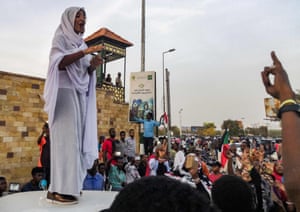Zeinab Mohammed Salih
Alaa Salah, 22, talks to the Guardian about having her image seen around the world.
The young woman in a photo that has come to symbolise the protest movement in Sudan has been identified as Alaa Salah, a 22-year-old architecture student in Khartoum.
Salah told the Guardian she was happy that the image, taken on Monday evening at a demonstration in the Sudanese capital, had been viewed so widely.
“I’m very glad that my photo let people around the world know about the revolution in Sudan … Since the beginning of the uprising I have been going out every day and participating in the demonstrations because my parents raised me to love our home,” Salah said.
The current wave of protests against the 30-year rule of Omar al-Bashir started in December but intensified at the weekend when huge crowds gathered at a crossroads in front of a heavily guarded military complex in the centre of Khartoum.
Salah said she does not come from a political background, and took to the streets to fight for a better Sudan. “Our country is above any political parties and any sectarian divisions,” she said.
“The day they took the photo, I went to 10 different gatherings and read a revolutionary poem. It makes people very enthusiastic. In the beginning I found a group of about six women and I started singing, and they started singing with me, then the gathering became really big.
A line in the poem she read - “The bullet doesn’t kill. What kills is the silence of people” – is popular with protesters, and was chanted by demonstrators in January 2018 and during unrest in September 2013.“I have practiced presenting at the university; I don’t have an issue with speaking in front of people and at big gatherings.”
Salah’s mother is a fashion designer working with the traditional Sudanese toub – the dress she was wearing in the photographs – and her father owns a construction company.
The garment has become a symbol of the female protesters, and Salah said she had narrowly escaped arrest when she wore the toub at an earlier demonstration.
“The toub has a kind of power and it reminds us of the Kandakas,” Salah said.
Kandakas were queens of the Nubian kingdom of Kush, which ruled much of what is now modern-day Sudan more than 3,000 years ago.
Some commentators have raised concerns that the reference represents only one of Sudan’s many ethnic and tribal communities and that while the history of the Nubians is particularly popular with the Sudanese diaspora it excludes many of the country’s communities.
Salah said she now has to rest her voice as her throat has become sore from all the chanting this week.

No comments:
Post a Comment